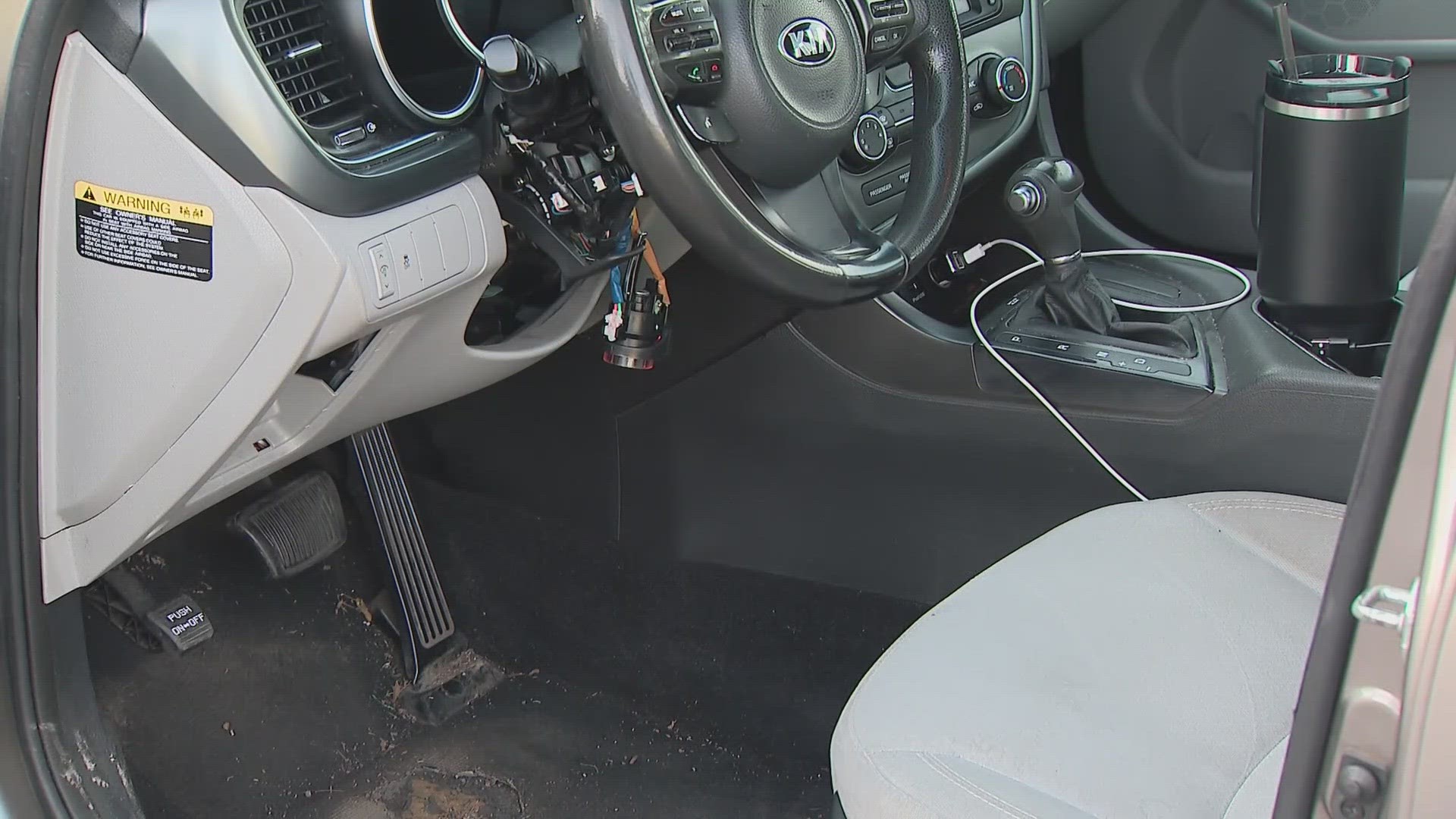COLUMBUS, Ohio — Nearly three months ago, Hyundai and Kia unveiled software that was designed to thwart an epidemic of thefts of their vehicles, caused by a security flaw that was exposed on TikTok and other social media sites.
CrimeTracker 10 has been reporting on the trend for more than a year.
However, data from cities across the U.S. and in central Ohio shows thieves are still driving off with the vehicles at an alarming rate.
Right now, millions of vehicles are still vulnerable, despite an available software update.
Many are now calling on the federal government to take action, fearing this vehicle hacking trend could grow in the years ahead, giving thieves more options.
“Never would have imagined, i never would have imagined,” Anthony McSwain said.
McSwain never thought the word victim would be associated with his name.
“I was just, I was just shocked. Like, I can't. I can't believe this is happening,” McSwain said. His 2014 Kia Optima was stolen within seconds from outside his job on Cleveland Avenue in Columbus.
“As I went outside, I noticed my car was gone," McSwain said.
McSwain now joins a growing list of Kia and Hyundai owners, impacted by an alarming crime driven by social media.
Thieves are taking advantage of a design flaw with the ignition system. They are able to steal the cars by using only a screwdriver and a USB cable.
A software upgrade released by the automakers nearly three months ago – was designed to put the brakes on the rolling theft epidemic, making the vehicles harder to steal.
However, McSwain says in his case, thieves found a work-around.
“They told me like $2,500 to $5,000 to repair my steering column. And I explained to them, you know, I brought this car to use for an update. And they just said that i needed to contact Kia corporate,” McSwain said.
According to numbers provided by the Columbus Division of Police, overall – the number of stolen Kias and Hyundais combined in the city is already outpacing larger cities like Minneapolis with close to 2,000 thefts. Columbus is on track to break last year's record for stolen Kias.
"The whole thing is a tragedy. And it's amazing that it could be could have been prevented by, you know, a tiny piece of equipment that didn't cost that much," said Michael Brooks, the executive director of the Center for Auto Safety.
Both Hyundai and Kia say they're accelerating the distribution of their security software, but some say that rollout has been too slow.
"The spread of the TikTok hack is far outpacing the repairs that are going into vehicles right now," Brooks said.
Brooks said out of the 8 million eligible vehicles, only 10% of them have been fixed.
"So that means nine out of every 10 vehicles of would-be thieves approaches is not going to be fixed. And they're going to be able to use the tick tock act on it, ” Michael Brooks said.
Brooks calls this a public safety crisis, one we've never seen before involving auto hacking.
“There are many, many, many possibilities in the world of vehicles and cybersecurity and a lot of them are pretty grim. And right now, there are no minimum standards that are required by the government when it comes to vehicle cybersecurity,” Michael Brooks said.
While Kia and Hyundai are the targets now, Brooks warns that with more and more vehicles become technology reliant – it’s only a matter of time before hackers could start targeting other automakers.
“I think it's really important for the government to get involved now and tell automakers that they need to upgrade their cybersecurity so that in you know, 15 years down the road. The next Hyundai and Kia situation like this where there's a cyber problem doesn't turn into something even more deadly,” Brooks said.
There is a push by at least 17 attorney generals from across the country urging the federal government to step in and issue a recall on these vehicles - calling them unsafe
Meanwhile - just last week Hyundai and Kia, agreed to a class action lawsuit settlement worth nearly $200 million, which you likely qualify for if your vehicle was damaged, stolen or totaled due to this ongoing flaw.
That payout individually can range between $3,000 and $6,000.
This settlement is still awaiting final approval from a judge overseeing the case, which is expected to happen in July. That's when the money could start being released.
Until then, experts say steering wheel locks and parking in secure areas are the best defenses
10TV reached out to both Kia and Hyundai for comment. Kia did not reply by the time this story aired, a corporate and marketing PR Manger for Hyundai wrote :
“At this time, Hyundai is not aware of any confirmed failures of the software and can report the software is in fact working as designed. Hyundai is committed to continuing our efforts in completing the software upgrade for all affected vehicles in the most effective manner possible. We are communicating with NHTSA on our many actions to assist our customers.”
For more details on the settlement, click here.

